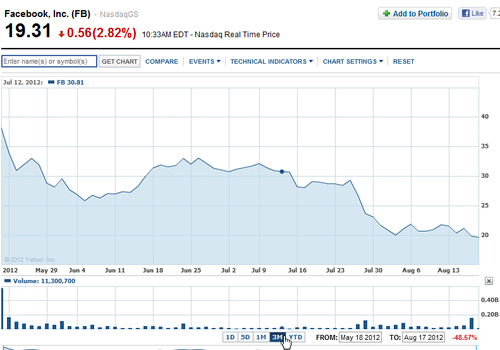Recently, on a trip to Silicon Valley to meet with execs and newsmakers I got a good sense of what tech business leaders were thinking. As you could expect “cautiously optimistic” was the tone but I sensed more optimism this year over last. It certainly wasn’t euphoria and a few people even said they were glad Facebook had a crappy IPO.
But I wonder if they expected the “crappy” IPO to have tuned into a stock which is setting new lows regularly.
An interesting point on Facebook is that many believed its trading on Second Market for years would have set an accurate price for the shares. In other words, if some of the savviest investors around were trading shares at a particular level for months if not years – it must be the right amount.
This chatter in fact likely encouraged many investors who saw little downside risk.
In fact an article in the San Francisco Chronicle on May 20th, 2012 echoed this sentiment in hindsight:
Secondary markets – where investors can buy stock in privately held companies from employees, former employees and early investors – did a pretty good job predicting Facebook’s public market value.
On SecondMarket, Facebook’s pre-IPO shares traded at an average price of $42.72 in the first week of April. The last trade was April 5.
On SharesPost, the last transaction took place at $44.10 per share on March 30.
Facebook priced its shares at $38 Thursday night. They opened at $42 per share on Friday, traded as high as $45 and closed at $38.23 on the Nasdaq.
Although they were frequently badgered to reveal where Facebook shares were trading in the private market, neither firm disclosed pricing until Facebook shares began trading publicly on Friday.
But with the stock plummeting even more recently, it is worth mentioning that share lock-up expirations can be brutal for a stock price. According to this same article cited above, things are bad now but could get even worse unless Facebook does something incredible with its earnings. Keep in mind we are just over 91 days from the IPO as you read:
“The expiration of the company’s share lock-ups could hit the company hard over the course of 2012,” Weiser wrote in a report. “In particular, 91 days after the IPO lock-up agreements covering 172 million shares will expire. Additionally, between 151 and 180 days post IPO, 247 million shares and share-equivalents will become unrestricted. Most significantly, 181 days after the IPO, lockups on 1.3 billion shares will expire.
“While we do not expect all of these shares to be sold, a significant number will be, especially if personal tax considerations create conditions whereby individuals will prefer to sell shares in 2012 rather than 2013.”
Facebook has incredible potential and the additional of a want button could certainly boost the company’s value tremendously. But when fighting against 1.3 billion shares available for trading, you are going to have absolutely incredible earnings and soon to offset this potential downward pressure.
Moreover, the decline in share price is taking its toll on the company’s management who are doing their best to retain talent – employees who thought they were mega-rich only to find out they are now just rich.
This could mean the leading social networking company will be forced to shift its strategy and focus more on short-term earnings gains as opposed to building a “long-term business model.”
Certainly the NASDAQ market glitch didn’t help get the IPO ball rolling but it seems Facebook should have been far more conservative when approaching this IPO.
And although it is logical that a poor Facebook IPO helps dampen the potential for “irrational exuberance 2.0”, a continuous Facebook share price “disaster” is likely not in the best interest of tech companies and investors either.






